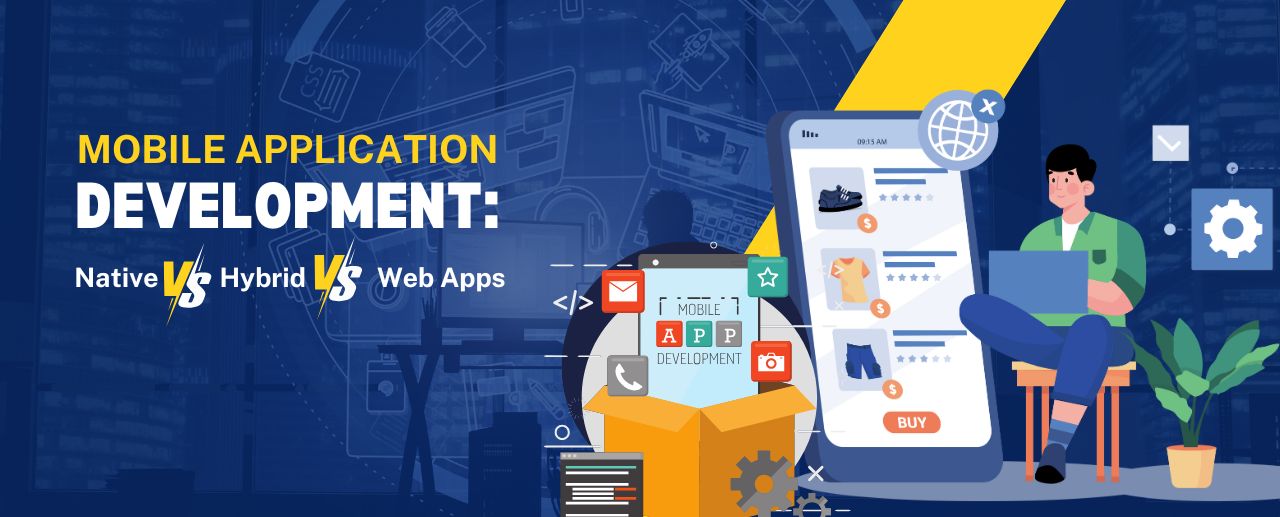Mobile App Development: Native vs. Hybrid vs. Web Apps

While browsing apps throughout the day, do you ever feel like some are built just for you, while others leave you frustrated and waiting for things to load?
Whether a native app, a hybrid, or a web app, each type is designed with a specific purpose. The key to a great user experience is knowing how each app type serves various business needs. This is where skilled mobile app developers from a mobile app development company make all the difference.
Whether you’re a startup, a growing business, an established brand, if you are looking for the right type of app for your needs, or a developer exploring mobile app development, you will find valuable insights as we are going to explain which type of app is going to do well for a specific industry. Read along.
Native Apps
Examples:
- Uber (Ride-sharing)
- Instagram (Social Media)
When to Choose:
Native apps are ideal for businesses that need the highest performance, advanced functionality, and a seamless user experience. They are built specifically for a platform (iOS or Android), which allows them to leverage the device’s full capabilities, such as GPS, camera, and push notifications.
1. Instagram offers a high-performance, feature-rich social media experience that benefits from native development, especially when processing high-quality images and videos in real time.
Best For:
- E-commerce businesses (e.g., Amazon, eBay).
- Travel and transportation companies (e.g., Uber, Lyft).
- Gaming companies (e.g., Fortnite).
Hybrid Apps
Examples:
- Alibaba (E-commerce)
- IKEA (Retail)
When to Choose:
Hybrid apps are built using web technologies (HTML, CSS, JavaScript) but are packaged inside a native container, allowing them to run on multiple platforms. Hybrid development is a great choice for businesses that need faster time-to-market and lower development costs without compromising performance.
1. Alibaba uses hybrid apps to provide a seamless shopping experience across both Android and iOS platforms. Since hybrid apps allow for a single codebase for multiple platforms, the business can maintain its app in a cost-effective way.
Best For:
- E-commerce platforms (e.g., Alibaba, eBay).
- Retailers (e.g., IKEA).
- Startups
Web Apps
Examples:
- Google Docs (Productivity)
- Spotify Web Player (Music Streaming)
When to Choose:
Web apps are accessed via a browser and do not need to be downloaded from an app store. They are ideal for businesses that want to offer a quick, simple solution without the need for complex features. Web apps are easy to maintain and can be developed quickly, but they may lack the performance and device integration of native apps.
1. Google Docs offers a great web-based word processor that doesn’t require any installation, allowing users to access documents from any device with internet connectivity.
Best For:
- Content-focused businesses (e.g., Google Docs, Medium).
- Companies with limited budgets (e.g., Spotify Web Player).
- Internal business tools such as CRM systems.
Before deciding which type of mobile app you will invest in, consider whether your app choice aligns with your business objectives and audience needs. Consulting with a professional mobile app development company makes sure your mobile app delivers maximum impact.
If you’ve made it this far, check out the infographic below for a quick visual summary.

About Us
Bluelupin Technologies is a top software development company in India, focused on delivering custom software solutions for businesses of all sizes. Startups, SMEs, and large enterprises rely on our expertise as we prioritize understanding each client’s unique needs and provide reliable, scalable solutions that foster growth.
